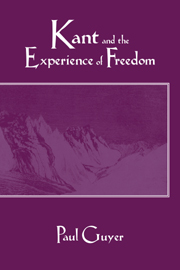Book contents
- Frontmatter
- Contents
- Preface
- Note on citations
- Introduction
- KANT'S AESTHETICS IN HISTORICAL CONTEXT
- Chapter 1 Feeling and freedom: Kant on aesthetics and morality
- Chapter 2 The dialectic of disinterestedness: I. Eighteenth-century aesthetics
- Chapter 3 The dialectic of disinterestedness: II. Kant and Schiller on interest in disinterestedness
- Chapter 4 The perfections of art: Mendelssohn, Moritz, and Kant
- Chapter 5 Hegel on Kant's aesthetics: necessity and contingency in beauty and art
- KANT'S AESTHETICS AND MORALITY: TOPICAL STUDIES
- Notes
- Bibliography
- Index
Chapter 3 - The dialectic of disinterestedness: II. Kant and Schiller on interest in disinterestedness
Published online by Cambridge University Press: 05 March 2012
- Frontmatter
- Contents
- Preface
- Note on citations
- Introduction
- KANT'S AESTHETICS IN HISTORICAL CONTEXT
- Chapter 1 Feeling and freedom: Kant on aesthetics and morality
- Chapter 2 The dialectic of disinterestedness: I. Eighteenth-century aesthetics
- Chapter 3 The dialectic of disinterestedness: II. Kant and Schiller on interest in disinterestedness
- Chapter 4 The perfections of art: Mendelssohn, Moritz, and Kant
- Chapter 5 Hegel on Kant's aesthetics: necessity and contingency in beauty and art
- KANT'S AESTHETICS AND MORALITY: TOPICAL STUDIES
- Notes
- Bibliography
- Index
Summary
As we have seen, the traditional account of the role of disinterestedness in the emergence of philosophical aesthetics in the eighteenth century needs revision. It is usually supposed that early in the century, Francis Hutcheson, the first professor to make a significant contribution to modern British philosophy, sanitized some ideas of the less rigorous Lord Shaftesbury, and described the workings of an alleged sense of beauty as an immediate response of pleasure to the perceived proportionality of an object that was prior to any conceptualization of the object, and therefore independent of any conception of an interest the object could serve, thereby offering the first theoretical characterization of the aesthetic as an independent form of experience. Toward the end of the century, then, Kant is supposed to have taken over this characterization of disinterestedness as the cornerstone of his attempt to show that judgments of taste could be founded on the subjective feeling of pleasure yet make a synthetic a priori claim to the agreement of all human beings that is parallel to the synthetic a priori claims of theoretical and practical reason, (that is, those claims that are the informative yet universal and necessary, and therefore nonempirical, principles which Kant had held lie at the foundation of both natural science and morality.) The intellectual challenge for Kant, on this account, was to show how a form of experience divorced from the constraints of scientific theory on the one hand and moral action on the other could nevertheless raise the same claim to universal validity as those obviously more rule-governed domains of human thought and action.
- Type
- Chapter
- Information
- Kant and the Experience of FreedomEssays on Aesthetics and Morality, pp. 94 - 130Publisher: Cambridge University PressPrint publication year: 1993

